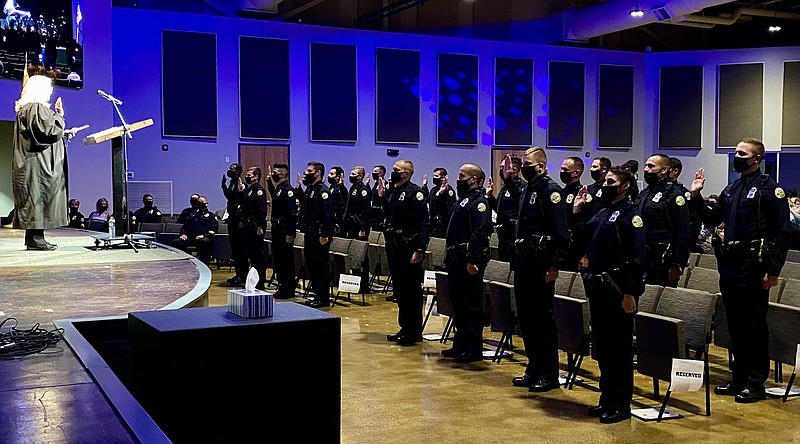Twenty-two officers joined the ranks of the Chattanooga Police Department this week, an achievement they weren't sure they'd reach this year.
The academy was the department's only one this year. In recent years, the department has held at least two academies per year.
The academy's first day was March 13, the same day the city of Chattanooga announced the measures it was taking to curb the spread of the COVID-19 pandemic. From then until several weeks later, the cadets were expected to learn from home.
"I think a lot of us were excited to get started," newly graduated Officer James O'Neil said. "You know, it was a lot of work to get into the academy, even So it was kind of a bummer. It's like, 'Oh, man. We gotta wait.' But I think everybody bounced back real well.
"We had a pretty positive attitude coming in," the 28-year-old added. "I mean, obviously, we're a new generation, new academy. And our motto was, 'Be the change you want to see.'"
For the instructors, too, the shift was unexpected, sometimes requiring last-minute creativity.
"It created a lot of extra work for us to come up with a plan and ideas [for] worthwhile assignments that we still are able to track and be able to record," training officer Phillip McCall said.
For weeks, cadets studied U.S. Supreme Court case law, wrote essays and watched training videos. Other classes do the same, but this year's class spent more time in the books, McCall said.
"I think that allowed them to assess not only our writing but our comprehension of law," O'Neil said. "It was kind of like having homework."
And then the Easter Sunday tornadoes hit the Tennessee Valley.
At least 11 people were killed, dozens more injured and many were left without power or a home in Southeast Tennessee and North Georgia.
Cadets were called in to assist in recovery efforts, something that turned into a team-building experience that they would have otherwise missed out on.
"We just kind of gave them the plan and the idea of what we were doing and just turned them loose and let them do it," McCall said. "They did a great job.
"Instead of one day of team-building exercises, we had a whole couple weeks of it," O'Neil said. "That kind of forced us to really work well together."
Even when the cadets were able to start attending classes in-person, they had to be spaced 6 feet apart and wear a face mask.
Their classroom was too small to accommodate social distancing, so a gym became the classroom.
Having to present and teach in that setting was complicated because it wasn't built to accommodate a learning environment, McCall said. Cadets had to work harder to pay attention.
Eventually, there came a time in which the hands-on training simply had to be done. So with health safety measures in place, they trained. And no one contracted COVID-19.
"I think all of us did a really good job of being like, 'OK, these are the people we're with, and we can't really hang out with other people.' I think it was hard. You're isolating with brand new people rather than friends and family you've known for a while."
But because of that need to isolate, this year's academy was unable to complete the department's "community immersion" program, a program designed to expose future officers in specific minority cultures across Chattanooga so that they're able to understand and empathize with those communities better.
Police Chief David Roddy said the department is working to find another way for the new officers to connect with communities in the same way while still maintaining safety protocols.
It wasn't until the last few days of the academy that cadets were able to sit in the classroom in which so many others before them have sat. And that was only because the fire department had to use the gym. Tables were moved around and spaced out as much as possible.
"There are a lot of plaques from previous classes and memorials for officers [on the walls]," O'Neil said. "It was interesting when we got to go in and everyone was looking at them. It's just like, you know, most academies, probably the first week or two, they're probably like, 'That's just the stuff on the wall.' But for us, it was like, 'Oh, cool. We can look at all this history.'"
While this year's academy missed out on a lot of what a typical academy would experience, they benefited in other ways, both McCall and Roddy said.
"In all of the challenges that they faced going through an academy in the middle of a pandemic, they started to build their own personal resiliency as a police officer, I think much sooner than other academy classes," Roddy said. "They were faced with changing expectations. They were given unknown timelines. They had to move into a learning experience which was an understated, atypical setting.
"That's a healthy perspective to have early in your career, because you don't know, coming into a shift in police work, what the end of that shift is going to look like," he added. "That ability to adapt and fluidity and expectations that this academy class has developed because of their personal circumstances in the academy will benefit them greatly as they move through their law enforcement careers."
When graduation finally came, "it was a little surreal," O'Neil said. "But I was excited."
"Everyone there was a little bit nervous about it, but it was mostly just excitement. Everybody was all in the back room waiting to march in, and I don't know. Like afterwards, it was like, 'Oh. We made it through that. We're done.'
"And also just being like, 'All right. There's another challenge coming next."
Contact Rosana Hughes at rhughes@timesfreepress.com or follow her on Twitter @HughesRosana.
